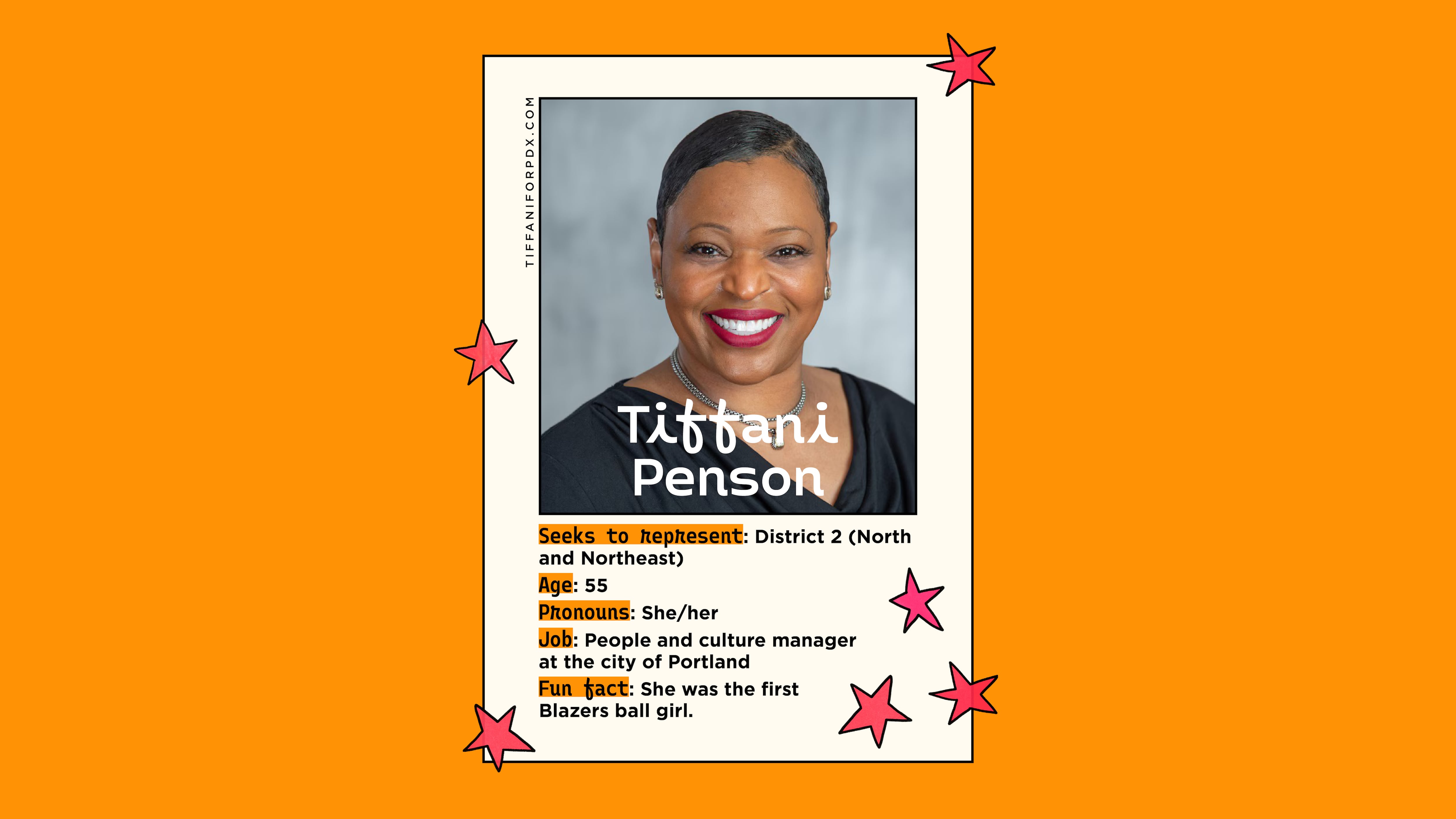Seeks to represent: District 2 (North and Northeast)
Age: 55
Pronouns: She/her
Job: People and culture manager at the city of Portland
Fun fact: She was the first Blazers ball girl.
“I was raised and rooted in Northeast Portland,” Tiffani Penson tells WW. “I live in my home in the Concordia neighborhood. It’s the home I grew up in.”
Now Penson is running to represent her home neighborhood, with hopes to alleviate Portland’s growing pains.
“Portland has grown from a big town to the 26th largest city in the United States. We’ve also seen our city’s challenges grow,” she says. “We feel them every day, from crime to housing and homelessness to a receding sense of livability.”
Penson has been working for the city of Portland for almost 19 years. She started as a public outreach coordinator and then was a bureau support manager for Mayor Sam Adams. She then helped create the first supplier diversity officer position, where she assisted businesses owned by people of color, women and veterans that sought city contracts. Now as the city’s people and culture manager, she collects data and reviews city policies and feedback to operationalize core values of anti-racism, equity and transparency within City Hall and its bureaus.
Penson’s campaign has raised $106,000—enough to unlock $40,000 in public funds. She’s been endorsed by three commissioners (Rene Gonzalez, Mingus Mapps and Carmen Rubio), the Portland Association of Teachers, the Portland Fire Fighters’ Association, and the Portland Police Association.
We spoke to Penson about her campaign. Questions and answers have been lightly edited for brevity and clarity.
WW: What are your top three priorities if elected?
Tiffani Penson: My top three priorities are to make Portland a safe and livable city, to ensure that everyone has a home, and to strengthen our economy and workforce. Then, beyond policing, it is time to clean up our public spaces and make our neighborhoods safe places where we can all live, work and play. I’m really focused on getting back to delivering the basic services like removing trash and graffiti and keeping neighborhoods safe, making sure that we allocate the appropriate resources to make our 911 system work better, and continuing to work on addressing gun violence by funding programs that have been proven to reduce it.
Beyond policing, what measures would you take to improve public safety in Portland neighborhoods?
I believe that if Portland Street Response were able to have skilled clinicians, as it was originally designed to, and be able to transport people who are in crisis to get help, that would make for a very effective program. When people are in crisis and they need help, they can’t always just think to call these numbers and access these things. They need people to be able to take them to get the help they need.
How would you support local businesses and foster economic growth in Portland?
I created the first role of supplier diversity officer where I worked with minority women, disadvantaged people, emerging businesses and veteran-owned to help them access city contracting. The role provided business and technical assistance but also helped these small businesses pass through the red tape to do business in our city. I will work to expand this model.
What aspects of the city’s current approach to drug use and overdose deaths do you support and what would you change?
We can’t have open-air drug use. I grew up at nine years old taking the bus from where I currently live, from Northeast 25th all the way to Catlin Gabel by myself. I went to St. Mary’s Cathedral and Lincoln, so I spent my whole education freely taking the bus downtown and moving around this city feeling safe on buses. We’ve got to make sure we have the infrastructure so when we are in contact with folks that need our help, there is a place that can actually go and get help. Nobody wakes up and says, “I’m going to be a drug addict.”
Do you support the city staying in the Joint Office of Homeless Services? What’s your plan to address homelessness?
I support staying in the Joint Office because we need to work together to solve the houseless crisis. We all get the taxpayers’ money, so we need to be collectively working to solve the issues that are plaguing our community.
The first couple of actions I would take to address homelessness and housing affordability would be to convene a meeting with the state, county and city leaders to share information on the various plans each organization has on these issues, identify all the funding and budgets already allocated to these issues, and co-create plans of how we will work together to better serve our public. It’s our job to internally streamline, communicate and make sure we are delivering services and serving our people. We need temporary housing shelters. We need affordable housing. We need all levels to take care of our folks. I would also look at and review the current affordable housing policies and practices and see what is, what has worked in the past, and then determine what new policies we have to create.
Which current City Council member do you and your policies most align with?
I’m proud to have the support of all three current city commissioners who are running for mayor.
How do you feel about the new structure of city government and ranked-choice voting?
I’ve worked [at the city] for a long time, and I am so excited about this new form of government. I’m excited for the city councilors to become a legislative body focusing on policy and budget and then holding the mayor and the city administrator accountable for operationalizing it. The city administrator role is very important. That role needs to be highly qualified and be really experienced in running a city our size. We have big-city problems, and the 12 people chosen for this must be able to collaborate and work together, communicate effectively, get out there, understand what the needs of the people are, and be able to translate that into policy.
I think ranked-choice voting is new, and one of the things I’m most concerned about is making sure all our voters understand how to do it.
See the other Portland City Council Candidates here!
 This article is part of Willamette Week’s Ballot Buddy, our special 2024 election coverage. Read more Ballot Buddy here.
This article is part of Willamette Week’s Ballot Buddy, our special 2024 election coverage. Read more Ballot Buddy here.

